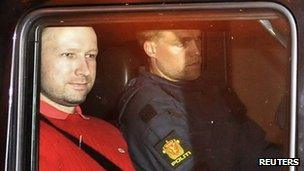Norwegian disbelief at Breivik 'insanity'
- Published

Many Norwegians fear that the decision may mean Breivik evades punishment
The Norwegian public, politicians and experts alike are expressing surprise at the verdict of insanity delivered by the forensic psychiatrists assessing Anders Behring Breivik.
Many psychiatrists were quoted by the news media ahead of Tuesday's announcement as saying that he was likely to be deemed sane.
In the event, the two court-appointed psychiatrists, Torgeir Husby and Synne Soerheim, concluded that Breivik had "developed the mental disorder of paranoid schizophrenia".
Breivik himself has said he found the verdict insulting and that although he had feared it, he had not expected this outcome.
The Norwegian media's general use of the term schizophrenic also fails to match their portrayal of Breivik. This makes it hard for people to understand how the verdict was reached, triggering concerns that he is "getting away lightly".
The media have given minute descriptions of how Breivik spent years planning his attacks. His ability to do so makes it difficult for many people to accept that he cannot be held to account for them.
Experts divided
In Norway, only about one in five of similar forensic assessments tend to conclude that the perpetrator was insane. This has led even some experts to question the committee's findings.
Media coverage reflects the public's uncertainty at the verdict.
The website of the broadsheet newspaper Aftenposten carried a headline on Tuesday evening with a quote from a Swedish psychiatrist expressing surprise. He points out that Breivik does not appear to have been hallucinating at any point during the attack.
Svenn Torgersen, professor of psychology at the University of Oslo, pointed out to the newspaper Dagbladet that Hitler and Stalin would have been unlikely to receive the same diagnosis as Breivik.
Meanwhile, journalist and commentator Anders Giever remarked in the newspaper VG that although Breivik's statements might seem delusional to outsiders, he has most likely been supported in his view of reality by other users of the extreme right-wing forums he frequented.

The attacks have led to much soul-searching among Norwegians
The name of Quisling, leader of Norway's collaborationist government during the Nazi occupation, is frequently brought up in debates on web forums as a comparison.
Do somebody's extreme opinions preclude them from being held responsible for their actions?
There is also concern as to how this verdict will affect those directly affected by the attacks.
Lawyer Brynjar Meling, representing several of the victims of the attacks, has already requested a second opinion on the verdict.
Progress Party member Per Sandberg expressed surprise and outrage at the verdict in an interview with Norwegian public broadcaster NRK.
"The verdict cannot be accepted," he said. "Victims must be certain that he will not be released any time soon."
Sandberg added that his party, of which Breivik was previously a member, would call for a review of how one determines whether a person is fit to stand trial.
But Dagfinn Hoybraten, the previous Christian Democratic Party leader, told the broadcaster that he disagrees.
"We are fortunate to have an independent justice system in Norway, and therefore politicians like us need to keep from telling them what they should be doing," he said.
Liberal party leader Trine Skei Grande agreed, saying that the current regulations must be abided by.
Soul searching
The report will now be examined by the Forensic Commission, who are free to give further comments or ask for more work to be done.
Lawyers have however pointed out that they are unlikely to attempt to overturn the verdict of such a thorough report.
The trial will proceed in much the same manner as if Breivik had been found sound of mind. Evidence will still be examined, and the court has the final say as to whether or not they believe Breivik is guilty of having carried out the attacks.

The killings provoked an outpouring of grief in Norway
However, they usually heed the forensic assessment, which in all likelihood means he will not be sentenced to prison, but sectioned instead.
Some are less surprised by the verdict, pointing to Breivik's manifesto as evidence of his delusions.
Web forums also emphasise that this outcome is not entirely negative. If sent to prison, Breivik would have ample opportunity to stoke right-wing extremist opinions among fellow inmates as a sort of martyr.
Being under treatment in a high-security mental health unit will, if nothing else, would severely limit his ability to do so.
Lawyer Carl Bore, also representing some of the victims, told NRK that although he is surprised, he sees no reason to doubt the committee's verdict.
He points out that Norway has done a lot of soul-searching since this summer.
"People ask themselves how this could happen, and look for scapegoats," he said. "Maybe we can more easily move on as a society when we see that it was simply caused by a sick person."
Surprise or not, Norway's struggle to cope with this manifestation of right-wing extremism is sure to be affected by the verdict.